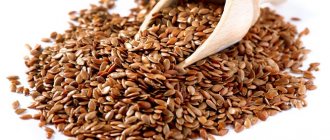Beneficial properties and effectiveness of use for the intestines
Flax seeds contain a large number of biologically active substances and microelements. These include:
- Plant fiber. Improves peristalsis, accelerates the movement of the food bolus through the intestines, and increases the volume of feces. Dietary fiber slows down the absorption of fats and carbohydrates, removes excess “bad” cholesterol, and normalizes the absorption of glucose.
- Linamarin. Regulates the motor, secretory and evacuation functions of the large and small intestines. Protects the mucous membrane of the digestive tract from irritation. Has a mild laxative effect. Has analgesic and anti-inflammatory effects.
- B vitamins. Increase the body's resistance, have a positive effect on the state of the central and peripheral nervous system, and brain function. Promote the absorption of nutrients, have a beneficial effect on metabolism, and participate in the transport of oxygen and carbon dioxide.
- Polyunsaturated fatty acids. Maintain the normal state of cell membranes, suppress the production of lipoproteins and triglycerides. Dissolve cholesterol plaques in arteries and veins.
- Polysaccharides. They remove excess cholesterol from the body, prevent the development of atherosclerosis, and are a source of energy. They have bactericidal, antioxidant and enveloping effects, preventing constipation. Prevents the accumulation of fluid in the intercellular space.
- Vegetable protein. Normalizes the condition of the gastrointestinal tract, maintains optimal microflora in the intestines. Provides binding and removal of toxins and breakdown products. Improves nutrient absorption.
Flax seeds have many biologically active substances and microelements.
Thus, flax seeds for the intestines can be taken for the prevention and treatment of many diseases of the digestive system. In addition, cleansing the body of harmful substances improves the functions of the immune system, increases vitality and overall performance.
Flax seeds for the stomach
Flax is an annual herbaceous plant that, when ripe, produces approximately 10 seeds inside its inflorescences. Their special chemical composition makes them very useful for both nutrition and medicinal use. The basis of the culinary and gastronomic characteristics are polyunsaturated acids, polysaccharides, proteins, lignans, vitamins and minerals that make up the seeds.
Typically, flax for the stomach is used in the form of decoctions, tinctures or porridges, where some of the accompanying substances pass from the seeds. Thanks to this, these drugs have the following properties:
- antiviral;
- disinfectants;
- wound healing;
- anti-sclerotic;
- painkillers.
Thus, by consuming flax seeds for the stomach, you can have a broader effect on the digestive system, improving its other parts.
Flax for the stomach: benefits and harm to the body
However, treatment of the stomach with flax seeds is based on another component of the composition - the mucus released during soaking. This jelly-like substance envelops the walls of the stomach, creating a barrier to irritation of inflamed or open areas by the acidic environment of the organ itself. In addition, it reduces secretory function, thereby reducing the activity of gastric juice secretion.
It is believed that flax seeds are suitable for treating gastritis of any stage. The medical community agrees with the safety of the product, but insists that in order to safely add it to the diet, you need to undergo a full examination. The fact is that the presence of pathologies or diseases associated with the excretory system, kidneys or liver is a contraindication to eating flax.
An additional effect is expressed in the cleansing functions of the seed. Flaxseed is important for the stomach because it stimulates and supports the elimination of toxins and food waste. This greatly facilitates the operation of the system and improves the quality of food absorption.
https://youtu.be/SiqH9_561lE
Indications for use
Colon cleansing is necessary in the following conditions:
- Digestive system dysfunction: bloating, rumbling in the stomach, constipation, diarrhea.
- Skin problems: pimples, acne, various rashes.
- Unpleasant odor from the mouth or the whole body.
- Cardiovascular diseases: arterial hypertension, atherosclerosis.
- Pathology of the respiratory system: frequent bronchitis, pharyngitis, tracheitis.
- Allergic rhinitis, hay fever, immunodeficiency.
- Metabolic changes: obesity, impaired glucose tolerance.
- Hypercholesterolemia or dyslipidemia.
- Inflammatory diseases of the gastrointestinal tract: gastritis, enteritis, peptic ulcer of the stomach or duodenum.
- Pathology of the urinary system: pyelonephritis, cystitis, urethritis.
Regular use of semen to cleanse the intestines improves vision, increases libido, reduces fatigue, nervousness, and irritability. This procedure helps improve the general condition of the body, quickly cure poisoning and intestinal infections, and speeds up the patient’s recovery.
Cleaning mechanism
The final section of the digestive system is represented by the small and large intestines. Its mucous membrane is heterogeneous. It has depressions, folds and protrusions in which waste or components of feces can accumulate. Removing these harmful substances is the main goal of a colon cleanse.
The mechanism of cleansing the body is as follows:
- Flax seeds enter the gastrointestinal tract. There they swell and gradually move through the intestines.
- The intestinal mucosa stretches, its surface straightens.
- The swollen seeds, as they move, cleanse the accumulations and toxins located there from the intestinal walls.
- Under the influence of peristalsis, the resulting lump moves and is excreted with feces.
- The mucus released from flax seeds envelops the mucous membrane and protects it from damage.
Flax seeds perfectly cleanse the intestines.
Flax acts as a natural absorbent, absorbs and removes harmful compounds. It also reduces inflammatory manifestations of gastroenteritis, Crohn's disease or ulcerative colitis.
However, it should be remembered that the use of flax seeds to cleanse the intestines is only indicated for the prevention of existing chronic diseases. In case of exacerbation of the pathology, this manipulation is ineffective. In this case, medication is necessary.
Applications for stomach diseases
The basis of treatment for gastritis and peptic ulcers remains the use of drug therapy. This is due to studies that show that the main cause of inflammatory diseases of the stomach is Helicobacter pylori infection, as well as the high effectiveness of new antisecretory drugs - proton pump inhibitors.
Traditional medicine plays an additional role in this situation. It helps relieve dyspeptic symptoms, normalize acidity levels and protect the gastric mucosa from additional damage. In fact, they are analogues of antacids, but flax seeds also promote the regeneration of organ wall cells.
You should also not forget about the importance of diet, since certain foods (alcohol, citrus fruits, canned or fried foods) can contribute to the progression of the disease.
Principles and rules of use
To properly and effectively cleanse the intestines with flax seeds, you should follow some simple rules. Before the procedure you must:
- Avoid alcohol and nicotine.
- Eliminate sweets, smoked meats, fatty meats, and seasonings from the diet.
- Drink at least 1.5 - 2 liters daily. clean water.
- Replace coffee with green tea.
- Consume more dairy and plant products: kefir, fermented baked milk, vegetables, cottage cheese, fruits.
- Limit white bread and baked goods.
- Take a shower or bath daily.
Compliance with the above recommendations will allow you to maximally rid your body of harmful substances and neutralize existing toxins.
How to take it correctly, benefits and harms
There are traditional medicine recipes that have been tested for years, which are based on the use of this amazing plant to treat many problems, including those with the stomach and intestines.
Both the seeds themselves and infusions, decoctions, and jelly are used. How to take flax seeds depends on what result we want to achieve. What dose to take, when and how, in order to understand what will happen as a result, because benefit and harm are always nearby. If the goal is to improve metabolism and boost immunity, 5-7 g of flax seeds per day is enough; if you treat diseases, up to 20-50 years. Thus, for the prevention of diseases, a teaspoon of seeds per day is enough, and for treatment, up to two tablespoons per day are needed. And be sure to drink more water during treatment with flax seeds (if in dry form) - up to 2 liters per day (20-30 ml per 1 kg of weight).
If a person uses jelly, an infusion of flax seeds, in treatment, then a course of 10-14 days is recommended during the period of exacerbation. After a one to two week break, you can repeat the course.
Flax seeds are wonderful helpers. But everything needs moderation. When you should be especially careful not to cross the line between benefit and harm:
- When there is uterine fibroid, endometritis, polycystic disease.
- When there are problems with the prostate gland.
- When there is poor blood clotting.
- When you have diabetes.
- When there is cholecystitis.
- When there are stones in the gall bladder, kidneys.
- In the presence of pancreatitis.
- When using seeds causes abdominal discomfort.
Pregnant and nursing mothers should also be careful.
The use of seeds is also fraught with a tendency to allergies to the oil of this plant. It is also worth consulting with your doctor when you are taking other medications at the same time.
Important! Using flax in double or triple quantities will not speed up treatment, but will only cause harm. If there is a tendency to internal bleeding, a large dosage can provoke it. In addition, intestinal discomfort may appear in the form of flatulence and diarrhea.
Flax-based recipes for colon cleansing
Many people are interested in how to drink flax seeds correctly. To cleanse the large intestine or small intestine, they can be taken in any form. From them you can prepare flaxseed decoction, infusion or jelly. In order to cleanse the body as a whole, the seeds can be consumed crushed or whole.
It is better to prepare ground flaxseed, infusion or oil mixture immediately before use. They cannot be harvested in advance, because under the influence of air the seeds oxidize and the beneficial properties of the plant disappear.
The most effective recipes include the following:
- Flax with kefir. The course of treatment lasts 3 weeks. During the first week, add 1 tsp to 100 ml of kefir. seeds, in the second week - 2 tsp, in the third - 3 tsp. Flax seed with kefir to cleanse the intestines is taken in the morning, on an empty stomach, 1 hour before breakfast. To enhance the effect, you can take 1/2 glass of clean, cool water with this drink. The “cleansed” body will quickly be freed from harmful substances, and the patient’s well-being will improve.
- A mixture of flaxseed and dill seed. You need to grind 50 g of seeds and transfer them to a glass container. Pour 500 ml of boiling water. Let it brew for 3 hours, then mix thoroughly. Drink 1/2 glass twice a day before meals.
- Infusion. 1 tbsp. seeds pour 200 ml. boiling water Cover with a lid. Leave for 8 hours. Then they mix, drink the liquid, and eat the seeds. To cleanse the intestines, the drink is taken every day, morning and evening. You should drink the infusion of flax seeds strictly on an empty stomach, before eating.
- Flaxseed oil. To prepare it, 2 tbsp. seeds are ground and mixed with 250 ml. sunflower oil. Place in a cool place for 7 days, shake daily. Drink 1 tbsp. 1 hour before meals 2 times a day.
- Decoction. Before brewing flax seed to cleanse and treat the intestines, the seeds need to be ground. Then you should take 50 g of the resulting powder and pour a glass of boiling water. Place on low heat, simmer for 10-15 minutes, cool. Then strain and drink. Can be consumed in the morning or evening for 14 days.
- Flax and honey To prepare this remedy, take equal proportions of whole flax seeds and honey. Then they need to be mixed and taken 1 tbsp. 3 times a day. It is recommended to drink plenty of water.
- Kissel. Take 2 tsp. flaxseed flour, pour a glass of water. Leave for several hours in a warm place. Then put on low heat and bring to a boil. Drink 1 glass in the morning on an empty stomach.
The duration of therapy is 3–4 weeks. It is recommended to take flaxseed in combination with the main treatment. If no positive dynamics are observed within 7 days, then the course is interrupted and other methods of traditional medicine are used.
Flaxseed flour
It is better to buy ready-made flax seed flour, because it is impossible to grind the seeds so finely at home. The product is available for free sale. Flour is added to food and drinks (tea, dairy products).
It contains vitamins B1, B2, B6, A, E and trace elements: potassium, zinc, magnesium, selenium, sodium, chromium, as well as very necessary fatty acids Omega-3 and Omega-6. The human body cannot synthesize these acids itself and receives them only from the outside, with food.
Flour is also used for colitis, chronic constipation, stomach and duodenal ulcers. Flour, entering the stomach, soothes irritation and inflammation, enveloping its walls.
Flaxseed flour can be used in dry form, or you can add warm water and take it orally as a paste. Use 2 times a day for 2 weeks. Don't forget to drink plenty of water.
Contraindications
Before taking flax seeds for treatment and cleansing the intestines, you should consult your doctor. In some cases, carrying out such a cleansing procedure may not be beneficial and lead to adverse consequences. Contraindications for cleansing the body are:
- Cholelithiasis.
- Stones in the kidneys.
- Acute viral infections.
- Exacerbation of a chronic disease.
- Individual intolerance to flaxseed.
- Intestinal obstruction.
- Condition after recent operations on the digestive system.
- Polyps and tumors of the large or small intestine.
- Children up to 3 years old.
- Pregnancy and breastfeeding period.
The period of breastfeeding is a contraindication to the use of flax seeds for the intestines.
The use of flax seeds for the treatment of the intestines helps to loosen the stool. Therefore, they should be used with caution in cases of severe diarrhea, hemorrhoids, and foodborne illnesses.
Cleansing the body with flaxseed is necessary only during the period of remission of chronic diseases. Before the procedure, you need to study possible contraindications and side effects. Systematic cleansing of the intestines normalizes metabolism, cleanses the body of waste and toxins, and increases overall performance.
Recommendations from a gastroenterologist
The role of traditional medicine (and flax seeds) in the treatment of diseases has decreased significantly over recent decades. Today, effective therapy for stomach diseases is based on the following principles:
- Treatment should only be prescribed by a qualified physician. Self-medication often leads to chronicity of the disease, even if for a certain period the symptoms no longer bother the patient. Do not trust reviews from friends or the Internet.
- A fibrogastroduodenoscopy must be performed with measurement of acidity in the stomach cavity and (if necessary) a biopsy followed by a cytological examination (to exclude cancer).
- When determining Helicobacter pylori infection, eradication therapy is prescribed, which includes proton pump inhibitors and two antibiotics (amoxicillin and clarithromycin).
- The patient must be prescribed a diet. Products that can damage the gastric mucosa are removed from it.
- With long-term use of anti-inflammatory drugs (NSAIDs, glucocorticosteroids) or a combination of antiplatelet agents, their correction is carried out.
- Remedies made from flax seeds can reduce the severity of dyspeptic disorders (feelings of heaviness, abdominal pain, nausea, sour belching), increase appetite and normalize gastric motility.











